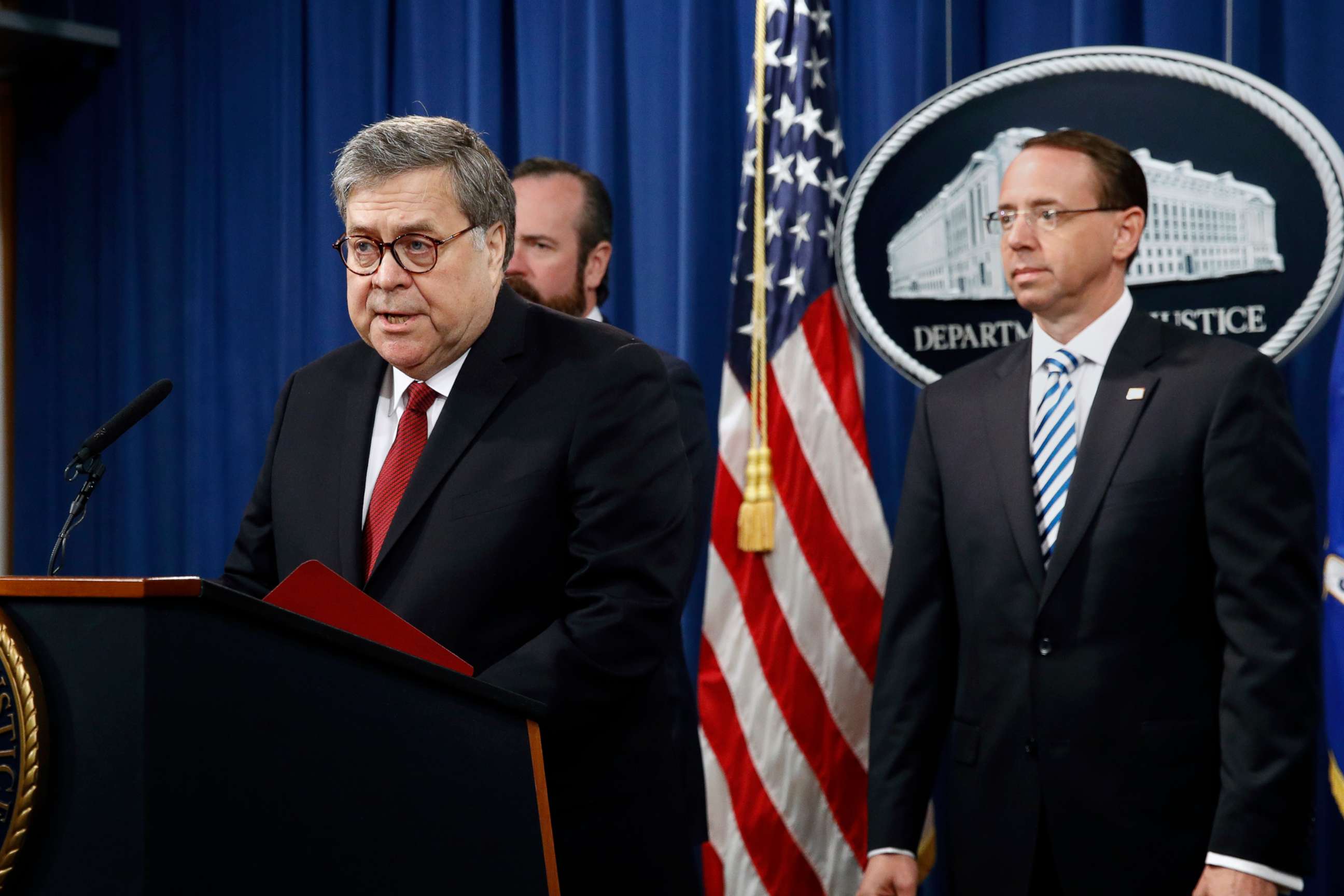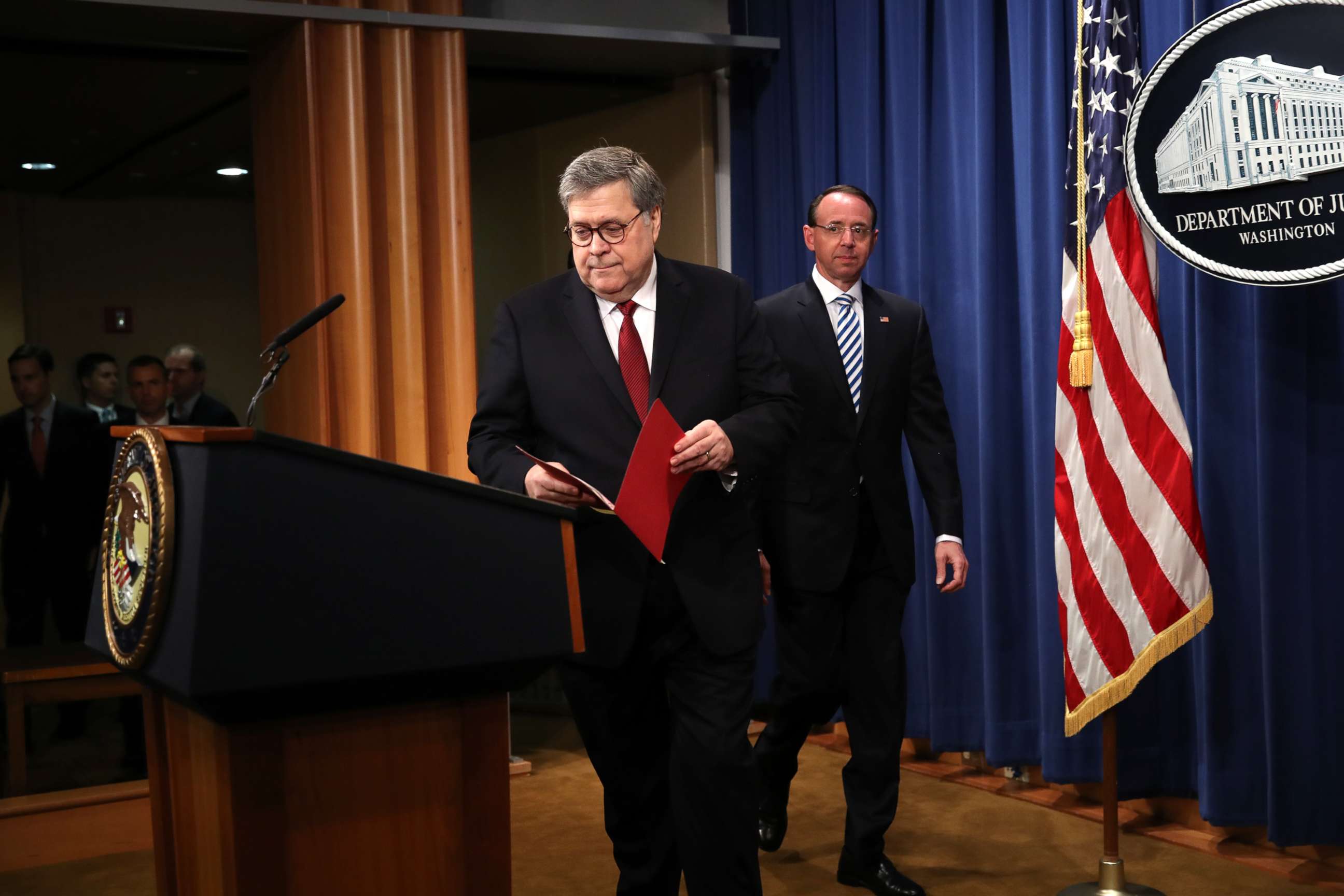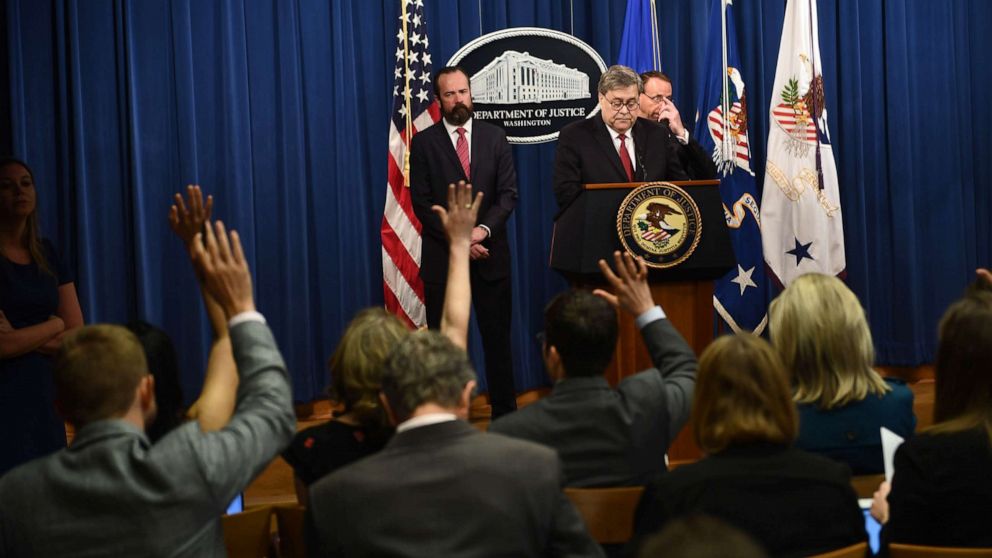Attorney General William Barr defends Trump's actions, handling of Mueller report ahead of its release
At a news conference Thursday morning ahead of his release of special counsel Robert Mueller's redacted report, Attorney General William Barr defended President Donald Trump's actions with regard to possible obstruction of justice as well as his own decision to speak about the report before releasing it.
Barr started by saying he was committed to providing "the greatest degree possible of transparency concerning the special counsel's investigation, consistent with the law."
Barr held the news conference hours before he was set to send Mueller's report to Congress and make it public, drawing sharp criticism from congressional Democrats who suggested he was doing the president's bidding by trying to characterize the report before lawmakers and the American public had a chance to read it.
Though the special counsel's lengthy report was not yet public and will include many details, Barr repeated what he wrote last month in his four-page outline of Mueller's findings that the report found no evidence the Trump campaign colluded with the Russian government ahead of the 2016 presidential election.
"As the special counsel report makes clear, the Russian government sought to interfere in our election process, but thanks to the special counsel's thorough investigation, we now know that the Russian operatives who perpetrated these schemes did not have the cooperation of President Trump or the Trump campaign, or the knowing assistance of any other American for that matter. That is something all Americans can and should be grateful to have confirmed," Barr said.
"In other words, there was no evidence of the Trump campaign’s collusion of the Russian government’s hacking," he later emphasized.
In total, Barr repeated at least eight times that the report found no evidence that Trump or the Trump campaign colluded, conspired or coordinated with the Russian government.

Barr also said executive privilege, which can be claimed by the president to withhold communications between himself and his advisers, was not invoked by the White House to redact anything from the report -- though Barr defended executive privilege as "well within [the president's] rights."
The president’s personal counsel did review the report ahead of time, Barr said, which he said was consistent with an ethics law allowing people named in a report prepared by an independent counsel to read the report before it goes public. Three of Trump's lawyers, Jay Sekulow, Jane Raskin and Marty Raskin, visited the Justice Department to review the report on Tuesday and Wednesday, the two days before the report was released, the president's legal team told ABC News.
Barr addressed the conclusion he and Deputy Attorney General Rod Rosenstein reached that Trump did not commit obstruction of justice, citing ten episodes depicting potential obstruction he said were in the Mueller report. Rosenstein joined Barr for the controversial news conference Thursday morning.
"The report recounts ten episodes involving the president and discusses legal theories for connecting those activities," Barr said. "After carefully reviewing the facts and legal theories outlined in the report and in consultation with the Office of Legal Counsel and other department lawyers, the deputy attorney general and I concluded that the evidence developed by the special counsel is not subject to establish that the president committed an obstruction of justice offense."
The attorney general also said there were some areas where they disagreed with Mueller, Barr said.
“Although the deputy attorney general and I disagreed with some of the special counsel's legal theories and felt it didn't amount to obstruction in a matter of law, we didn't rely on that. We accepted the special counsel's legal framework for purposes of our analysis and evaluated the evidence in reaching our conclusions,” Barr said.
The special counsel did not make a traditional prosecutorial judgment on obstruction of justice, as was outlined in Barr's letter last month.
In Barr's March 24 letter, he wrote that “while this report does not conclude that the President committed a crime, it also does not exonerate him.”
Barr said that Meuller's report acknowledges "there is substantial evidence to show that the president was frustrated and angered by a sincere belief that the investigation was undermining his presidency, propelled by his political opponents, and fueled by illegal leaks.
"Nonetheless, the White House fully cooperated with the Special Counsel’s investigation, providing unfettered access to campaign and White House documents, directing senior aides to testify freely, and asserting no privilege claims, Barr said. And at the same time, the president took no act that in fact deprived the Special Counsel of the documents and witnesses necessary to complete his investigation.
"Apart from whether the acts were obstructive, this evidence of non-corrupt motives weighs heavily against any allegation that the president had a corrupt intent to obstruct the investigation," Barr said.
Barr also answered demands from Democrats, who have called on Mueller to testify publicly on the report. Barr said he had "no objections" to Mueller testifying.
Immediately, the Democrat who chairs the House Judiciary Committee, Rep. Jerry Nadler, said his committee has requested Mueller to appear as soon as possible, along with the official letter sent to Mueller.
“It is clear Congress and the American people must hear from Special Counsel Robert Mueller in person to better understand his findings,” Nadler tweeted.
The news conference was a last-minute addition for Washington, a city that has been preparing for the final report for almost two years now.
Mueller, who authored the report, was not on hand to take questions and is not expected to comment on the report, his spokesman Peter Carr told ABC News.
In an unusual turn of events, Trump first announced the news conference in a radio interview Wednesday afternoon, one day ahead of the scheduled release of the special counsel's report.
“Attorney General Barr will be giving a press conference, maybe I’ll do one after that, we’ll see,” the president said during a radio interview on WMAL's “The Larry O’Connor Show.” The Justice Department soon confirmed that a press conference would be held at 9:30 a.m. the following morning.
The Justice Department denied that the president or the White House requested the press conference. “It was our decision, and it was our idea,” said a Justice Department spokesperson.

Meanwhile, House Speaker Nancy Pelosi and Senate Minority Leader Chuck Schumer said Barr's handing of the report release has created a "crisis of confidence in his independence and impartiality." In order to restore trust, they said, Mueller must testify before Congress.
"We believe the only way to begin restoring public trust in the handling of the Special Counsel’s investigation is for Special Counsel Mueller himself to provide public testimony in the House and Senate as soon as possible. The American people deserve to hear the truth,” they said.
In a press conference Wednesday night after hearing about the press conference, Nadler accused Barr of “waging a media campaign” on Trump’s behalf.
“Attorney General Barr is not allowing the facts of the Mueller report to speak for themselves, but is trying to bake in the narrative about the report to the benefit of the White House,” said Nadler, a Democrat from New York.
Top House Democratic chairs, including Nadler, also called for Barr to cancel the press conference entirely, calling it "unnecessary and inappropriate" in a joint statement.
Soon after the report was delivered to Barr on March 22, the attorney general released a four-page summary of the report that laid out the “principal conclusions” of the investigation. It was immediately dismissed by Democrats on Capitol Hill as a report that “raises as many questions as it answers.”
Adding to the list of what to watch for, on Wednesday, the president said that he might also hold his own press conference, though the White House did not provide details on what style or when that event might happen ahead of the president's departure to Mar-a-Lago for the holiday weekend.
The White House also said it may release a “counter-report” at about “34 or 35” pages, according to the president’s lawyer Rudy Giuliani.
ABC News' John Santucci contributed to this report.




